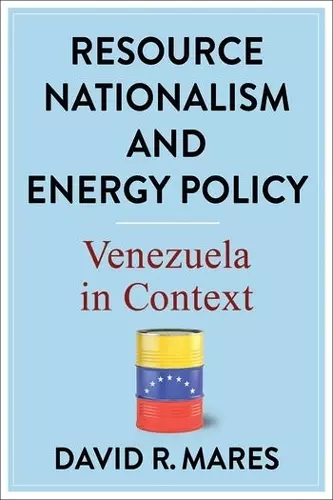Resource Nationalism and Energy Policy
Venezuela in Context
Format:Hardback
Publisher:Columbia University Press
Published:4th Oct '22
Currently unavailable, and unfortunately no date known when it will be back

It is widely thought that state ownership of natural resources, oil and natural gas in particular, causes countries to fall under the sway of the “resource curse.” In such cases, governments allegedly display “resource nationalism,” which destabilizes the economy, society, and politics. In this book, David R. Mares dispels these beliefs and develops a powerful new account of the relationship between state resource ownership and energy policy.
Mares examines variations in energy policy across a wide range of countries, underscoring the fact that in most of the world outside the United States, subsoil natural resources are owned by the state. He considers the history of Latin American oil and gas policies and provides an in-depth analysis of Venezuela from 1989 to 2016—before, during, and after the presidency of Hugo Chávez. Mares demonstrates that the key factors that influence energy policy are the inclusiveness of the political system, the level of competitiveness within policy making, and the characteristics of individual leaders. Domestic politics, not state ownership, determines the effectiveness and efficiency of energy policies: the “resource curse” is avoidable. Drawing on these findings, Mares reconceptualizes resource nationalism, arguing that government intervention into resource extraction is legitimate as long as the benefits are shared through the provision of public goods. Featuring a sophisticated grasp of both Latin American politics and energy policy, this book sheds new light on why some governments are responsible stewards of natural resources while others appropriate national wealth for partisan or private benefit.
David R. Mares offers a remarkably useful analysis of the challenges of harnessing energy exports for sustainable development and the political dynamics that greatly complicate these challenges. His holistic political-economy approach integrates a comprehensive analytic map of political systems with in-depth understanding of the extraordinarily complicated case of Venezuela while also accounting for nationalization and privatization across Latin America. -- William Ascher, author of Why Governments Waste Natural Resources: Policy Failures in Developing Countries
Control of national hydrocarbon sectors, though often chronicled from an economic or legal point of view, is a highly political phenomenon. Political scientist David Mares unpacks the underlying drivers that influenced resource development and oil wealth in Latin America. His innovative methodological framework goes beyond simplistic explanations linked to the rhetoric about populism to offer extraordinary insights into the complex variables that influence who benefits from oil and who does not in societies like Venezuela. A must read for policy makers, students and scholars seeking to understand how oil alters political landscapes, often with negative consequences for the very citizens who should benefit most from this national patrimony. -- Amy Myers Jaffe, author of Energy's Digital Future: Harnessing Innovation for American Resilience and National Security
Latin American oil and natural gas policies are highly divergent across the countries in this region; they also change considerably over time. Consider Venezuela’s disastrous depredation of its once thriving hydrocarbon industry versus Brazil’s more steady hand. What accounts for these differences? In this sweeping, interesting book, David Mares challenges conventional wisdom, which argues that either geology, markets, or ideology explain this variation. Instead, he identifies three main causes: the political system’s inclusiveness, how competitive the policymaking body is and, in a breath of fresh air, individual leaders’ traits. Mares also looks at the effects of these policies on whether they promote the stewardship of the natural resource sector and development broadly. To do so, he takes history and fine-grained knowledge of these countries' resources, governments, and societies seriously. This book is a revelation and a must read for political scientists, economists, academics working in business school, policymakers, and anybody who wants to learn about the checkered but fascinating history and political economy of Latin American hydrocarbons. -- Victor Menaldo, author of The Institutions Curse: Natural Resources, Politics and Development
A must-read book for those interested in the determinants of oil policy in Latin America. Mares makes significant contributions to the literature on resource nationalism, showing how not only structural factors but also the inclusiveness and competitiveness of the political system shape energy policy. The in-depth case study of Venezuela constitutes by itself a major contribution, but the book’s lessons travel widely. -- Francisco Monaldi, director of the Latin American Energy Program, Baker Institute for Public Policy at Rice University
What causes the period waves of resource nationalism that sweep across the underdeveloped world? Meticulously researched and well argued, Mares overturns our understanding of resource nationalism. His proposed model that will change our understanding of the causes and consequences of the phenomenon and will force many of us to rethink what we thought we knew. -- Noel Maurer, author of The Empire Trap: The Rise and Fall of U.S. Intervention to Protect American Property Overseas, 1893-2013
ISBN: 9780231202947
Dimensions: unknown
Weight: unknown
312 pages